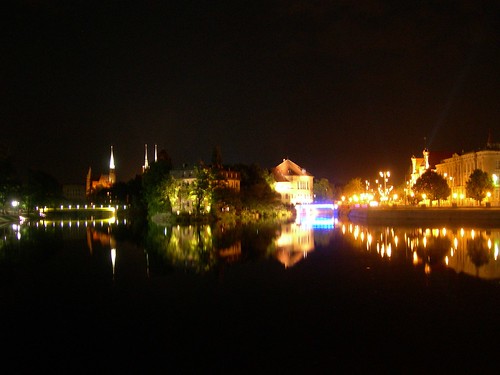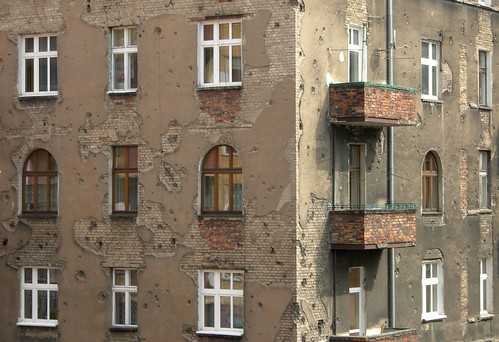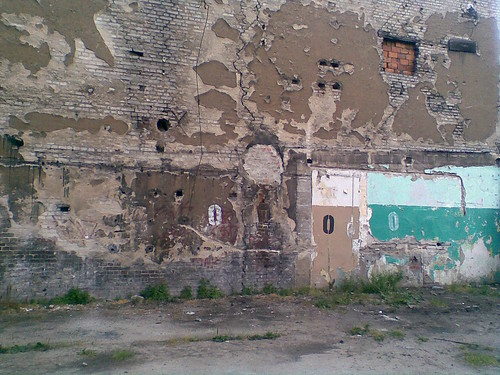Where to pull first? Knit? Crochet? Weave? Cut?
In typical procrastinator's style, I usually leave them for another day and walk away.
Not wise: The heap has been growing, knots getting pulled tighter.
So I'll start with the first thing I can reach: Location.
So I have been living in Wroclaw for nearly four months now.
As is typical for me, let's first address this from a linguistic angle: Wroclaw is neither "wrock law" nor "raw claw", it's "VROTS-wahf".
It is one of the larger cities in Poland (about 600,000 inhabitants), in the South-West, close to Germany and the Czech Republic.
It looks like this
and also like this
When I go out, things are centered around this square
and it is pretty and inviting, people are well-dressed and numerous, and all is well.
Once you leave the immediate center, the traces of socialism and 60 years of neglect jump at you again. The house across from mine (with this photo taken off my balcony) looks like this:
(My house, by the way, is pleasantly intact, and much younger.)
Wroclaw (then still German, and called Breslau) was a rather peaceful place for most of the war, with only few bombs being dropped here and most houses still intact. Then, in 1945, however, there was the Siege of Breslau, Germans inside, Soviets outside. Since the house appears to have been built somewhere around 1910, and there weren't any battles before or after the Siege that I have heard of, I could probably date all those charming bulletholes in the neighboring facade down to within three months.
The historian in me likes that.
The architect's daughter, however, winces. Not that this was a particularly pretty house, but around it, there are so many that still have bits of stucco, amazing ornaments in some cases, and it is a shame to watch the layers of decay (from paint peeling off down to bricks crumbling away) in what could be a breathtaking part of town.
So man-made destruction (direct, violent destruction, not the kind that happens through neglect) mostly happened in 1945.
In 1997, the Oder Flood (also known as the Century Flood) took down some more of these houses, many of them weak after all protective layers had worn off through the years.
That makes it difficult to decide which one my backyard fell victim to - the war or the water. "Backyard" actually makes it sound far too small - it once probably was a home to several hundred people. It is surrounded entirely by buildings - in fact, if you walk along the streets around it, you would not guess it is there because there are no gaps between the houses, with only narrow passages leading inside.
There, however, is a desert of dust, sand, and a few remaining floors - bits of concrete here, a few bricks there - a pointless wall leading through it, and small remaining buildings where you can still see where the other houses broke off. Much like a moonscape, including the dust - it has not been raining much, and even though my windows go to the street, there is no escaping the dust.
The historian in me likes that.
The architect's daughter, however, winces. Not that this was a particularly pretty house, but around it, there are so many that still have bits of stucco, amazing ornaments in some cases, and it is a shame to watch the layers of decay (from paint peeling off down to bricks crumbling away) in what could be a breathtaking part of town.
So man-made destruction (direct, violent destruction, not the kind that happens through neglect) mostly happened in 1945.
In 1997, the Oder Flood (also known as the Century Flood) took down some more of these houses, many of them weak after all protective layers had worn off through the years.
That makes it difficult to decide which one my backyard fell victim to - the war or the water. "Backyard" actually makes it sound far too small - it once probably was a home to several hundred people. It is surrounded entirely by buildings - in fact, if you walk along the streets around it, you would not guess it is there because there are no gaps between the houses, with only narrow passages leading inside.
There, however, is a desert of dust, sand, and a few remaining floors - bits of concrete here, a few bricks there - a pointless wall leading through it, and small remaining buildings where you can still see where the other houses broke off. Much like a moonscape, including the dust - it has not been raining much, and even though my windows go to the street, there is no escaping the dust.
It's quite similar to Eastern Germany, except that Poland did not have a wealthy sibling to help it back on its feet after communism was over.
Contrasts, then.
They lead to just as extreme mood swings - when I first got here, it was rainy, cold and dark whenever I got home from work. Walking down a street of dying houses can be infinitely depressing and doesn't exactly make you fall in love with your new home right away.
It can also play strange tricks on your eyes, with all those shadows and shapes formed by holes in plaster or paint or walls. One night, walking home, I saw an old lady, hunched over her walking stick. She turned abruptly, a bit after passing a street lamp, and turned into a doorway.
When I reached the spot where I thought she'd disappeared, I found the passage had been closed with a brick wall. Years ago.
I assume that she must have disappeared into one of the shadows behind it, the next one a small wooden door that looks like it leads to a coal cellar that's unused for years, and only the one behind it going into an actual house.
It must have been the bad lighting. Or so I like to tell myself.
Sunny mornings, however, bring out all the potential instead of the flaws - you see fading beauty, flower ornaments, art deco adornments, and notice what they must have been once, and could again be if somebody put time and money (mostly money, yes) into them. Some do, and on sunny days, you see the few examples of houses that have been re-painted and repaired.
But it's not that easy.
Sunny mornings also bring out the smell.
It appears that each and every entrance to each and every house in my street is frequently used as a toilet. Not a surprise, considering the abundance of alcohol shops in my street. (Usually, they announce they sell 'alkohole' in bold letters, with "groceries" (in Polish, obviously) added much smaller somewhere much less visible. These priorities are very, very honest.) So, their clients have needs, too. The doorways cater to them. That simple.
Surprising, however, is how serious and punctual and reliable most of these clients are about their hobbies.
Every morning, while I walk to work, I see the same alcoholics gathering in their favorite drinking spots. They do get up early. One guy in a wheelchair seems to change the corner of his preferred crossroad according to the time of day - when I walk to work, he's on one, next to a small newspaper stand. When I walk back, he's on the corner diagonally across, his vodka bottle by then considerably emptier.
Mostly, they are not very noticeable.
Last week, however, my morning began by having to step over a guy passed out on the sidewalk near my house - I first thought he was dead, but he was then scratching his head on the pavement, and the smell explained without a doubt why he was sleeping there - and then meeting only people who had neither showered nor washed or changed their clothes in several weeks, despite the summer heat.
Not the ideal way to make you fond of mankind.
And always, always, the word you hear most on the street is the one you were always told never to use, the one that I have seen making adult Polish women blush.
But that, before you get a wrong idea of Poland, has mostly to do with this neighborhood. The choice of drug is certainly typical, the degree of this, however, is not.





No comments:
Post a Comment